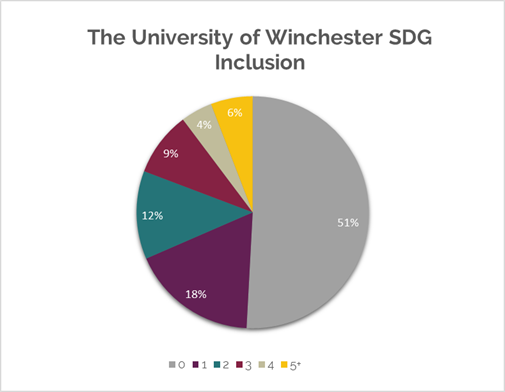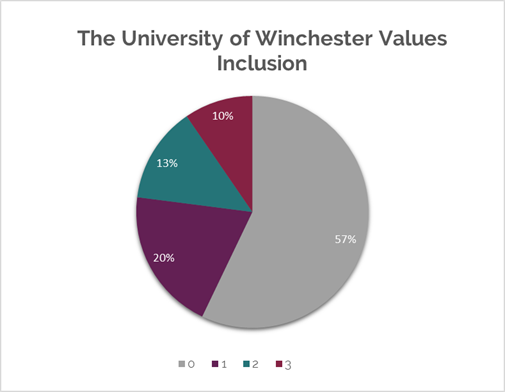Education for Sustainable Development
We are working with the NUS Responsible Futures programme - an accreditation mark and supported change programme for a whole-institution approach to environmental sustainability and social responsibility.

Education for Sustainable Development (ESD) supports learners across all academic disciplines and subject areas to create and pursue visions of a better world. A world that recognises the interdependence of environmental integrity, social justice and economic prosperity, while acknowledging that environmental resources are finite and provide the foundation for our society and economy. ESD develops competencies - skills, attributes and values - and demonstrates how they link to subject knowledge and knowledge of sustainable development.
This is a key priority for students and young people. Longitudinal survey data from Students Organising for Sustainability (UK) highlights that 80% of UK students want their institutions to be doing more on sustainability and the majority want to learn more about it.
The University’s Climate Change Education Strategy was first approved by the Board of Governors in 2017. It commits us to ensuring students graduate from the University with an understanding of how climate change is relevant to their subject area and their everyday lives and how they can address the challenges it presents.
The past 5 years have seen sustainable development and learning about the UN’s 17 Sustainable Development Goals (SDGs) successfully embedded into all aspects of the curriculum including formal, informal and subliminal learning. Our Sustainable Development Policy and Environmental Strategy explain how we approach this as an Institution, in partnership with our Student Union.
In 2018, we created our Centre for Climate Change Education and Communication and this was subsequently relaunched in 2021 as the Centre for Climate Change Action and Education, led by Dr Simon Boxley. Now a cluster in the wider Centre of Research for Educational Action and Theory Exchange (CREATE), it drives our ambition to include sustainability in all subjects of higher education.
Participation in the NUS Responsible Futures Programme is an essential guiding element of our Education for Sustainable Development (ESD) strategy. The University was first awarded this prestigious accreditation in 2019, demonstrating a whole-institution approach to education for sustainable development. Successful re-accreditation was achieved in 2021.
We have been a member of the NUS For Good initiative since 2016 and actively encourage students to partner with off-campus organisations to collaborate on dissertations and research projects themed around ethical, environmental, social or economic sustainability.
Responsible Futures Programme and Curriculum Audit
Responsible Futures is a whole-institution supported change programme and accreditation mark to embed sustainability across all aspects of student learning. The framework assists partnerships, made up of institutions and their associated students' unions, to legitimise and mainstream education for sustainable development as a tool for delivering an education which enables all learners and educators to realise their potential as global citizens.
During the 2017-18 academic year, a baseline curriculum audit was conducted on behalf of the University’s Responsible Futures Steering Group. The main aim of the audit was to determine the current levels of teaching, learning, and assessment relating to: the UN’s 17 Sustainable Development Goals (SDGs); the University’s three core values of Compassion, Individuals Matter and Spirituality; and Education for Sustainable Development pedagogy within taught undergraduate modules. Further objectives of the audit were to identify existing good practice, open up a discussion with academics and deans across faculties, and establish a quantitative baseline which allows for replicability to track progress over time.
The curriculum audit covered all four University faculties and encompassed almost 1500 modules. Twenty student volunteers, one PhD student and three Winchester Research Apprenticeship Programme (WRAP) students scanned each module’s descriptive document to locate references to the SDGs and the University’s values, as well as sustainability on a broader scale.
 |  |
|---|
The results of the baseline audit showed that 49% of the University’s undergraduate modules covered at least one issue relating to the SDGs, with 6% of modules covering five or more of the goals. In respect of the University’s values, 43% of our undergraduate modules reflect at least one of the values, with 10% reflecting all three.
A follow-up audit at programme level was completed in June 2021, led by Dr Simon Boxley. The findings have been disseminated to Faculty Deans, the Sustainability Committee and Student Representatives to individual faculties to progress the integration of the SDGs into the formal curriculum to ensure that all students at Winchester receive education on the SDGs as part of their programme.
For Good
The For Good platform gives students the opportunity to be a part of meaningful, exciting, and important work for sustainability. SOS-UK partners highly motivated students and recent graduates with forward-thinking organisations to collaborate on research, placements and practical projects to progress economic, social and environmental sustainability. The partnerships facilitate opportunities for students to apply their academic learning to a real-world setting whilst making a meaningful impact to the organisations they are partnered with. Through these opportunities, students are supported to gain experience and knowledge of working in a variety of sectors as well develop skills and competencies to be responsible citizens and leaders. Members of staff can also post research, placement or practical project opportunities on the platform. To find out more and learn about current opportunities visit the NUS For Good webpage or contact Karen.Cripps@winchester.ac.uk.
SDG Teach-In
The SDG Teach-In is a campaign to put the UN Sustainable Development Goals (SDGs), and therefore sustainability, at the heart of all stages of education, and across all disciplines. The Teach-In spans the formal, informal and subliminal curriculum by encouraging solutions-focused and participatory learning that is designed to:
- Raise awareness of the importance of sustainable development.
- Catalyse curriculum reform and test new ideas.
- Embed sustainability and social responsibility across all learning.
- Link teaching, learning, and assessment to local and global concerns.
- Prepare students with the knowledge, skills, and attributes to tackle the world's greatest challenges.
The annual campaign runs in February/March of each year and calls upon educators to include the SDGs within their teaching, learning and assessment during the campaign.
